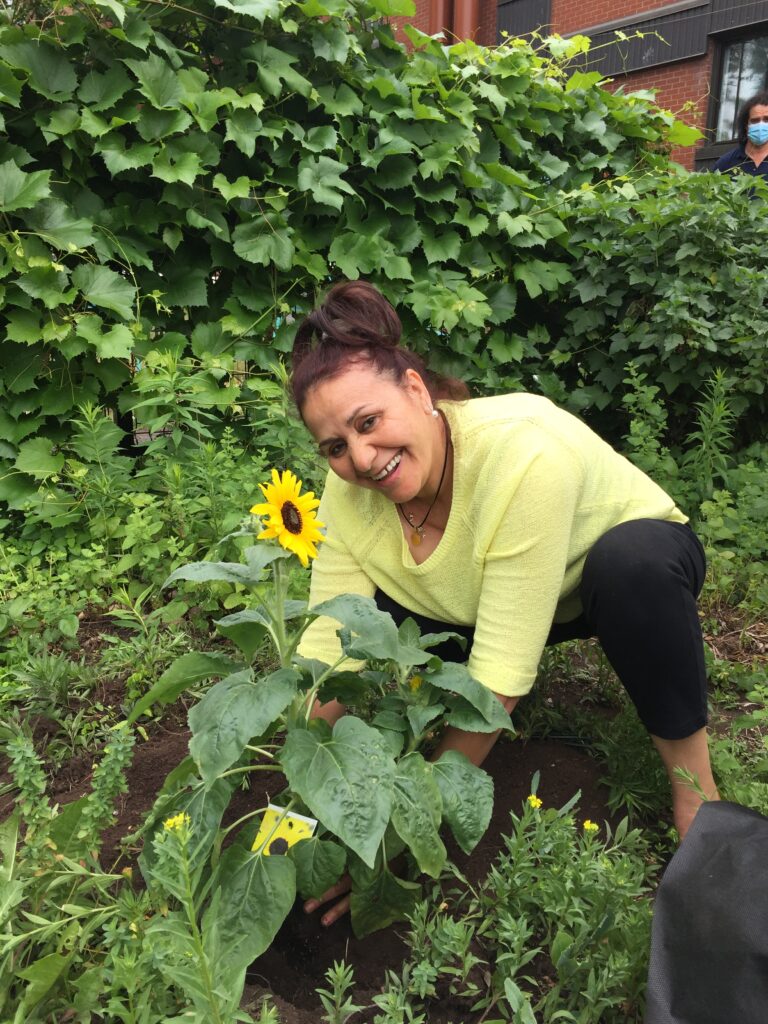Developing a natural ecosystem through urban agriculture allows us to act on several global issues such as the loss of biodiversity, the lack of vegetation in the city and food insecurity in urban areas.
However, we must not forget that the impact of an urban vegetable production space is first and foremost local: an urban farm project has the potential to improve the quality of life and engagement of the residents who benefit from it.
A look at the HLM Mentana project, an initiative led by the Cuisines Collectives du Grand Plateau, a non-profit organization whose mission is to help reduce food insecurity.
Connecting people to nature
Many of us realized it during the pandemic: contact with nature plays an important role in our well-being. According to the World Health Organization, green spaces help promote peace of mind, improve mental health, stimulate cognitive function, reduce exposure to air pollution, encourage a healthy and active lifestyle, and more (1).
An urban farming project in a residence contributes to the development of a green environment with beneficial effects for the tenants. Individuals are happy to be around plants, to have a green space where they can walk and observe biodiversity and, what’s more, provide them with fresh produce. This type of initiative invites people to connect with nature through agriculture, an opportunity that not everyone is fortunate enough to have.
“[This project] creates excitement and helps increase the residents’ sense of belonging.”
Sandrine Allen, animation coordinator at Collective Kitchens of the Grand Plateau

Growing social interactions
An urban farm is a gathering place that opens the door to exchanges between various individuals of different ages and cultures, around a shared theme: food. Sandrine, who is in charge of the project led by Cuisines Collectives du Plateau, has noticed this among the residents of the Mentana housing project:
“The garden is a space for experimentation, sharing and socialization. The garden is located in the center of the Mentana courtyard where several populations live together. There are teens, children, families and seniors. So this project has the potential to bring all of that together.”

Workshops to feed knowledge
An urban agriculture project is a great platform to address issues such as the importance of ecological farming or the impact of food waste. It is also a great activity to develop interpersonal skills and team spirit. From a broader perspective, such a project helps to educate individuals about healthier eating and living habits.
“Those who get more involved can learn a lot through a project like this. For example, they learn to work as a team, to consult each other and to make decisions together. There are three workshops during the summer. We had the first one and look forward to learning more!”

In short, whether the urban farming project takes place in a commercial or residential setting, it has the potential to unite and engage residents around a mobilizing and beneficial project, strengthening social ties and a sense of belonging.
Collective Kitchens of the Grand Plateau takes this approach a step further by providing less fortunate communities with the opportunity to enjoy a nourishing green space. Their efforts and those of our farmers are reflected in the energy and smiles of the residents of HLM Mentana, and that is heartwarming!
Want to get your community involved? Start your own urban farm project!
Contact us
SOURCE:
